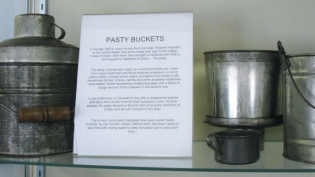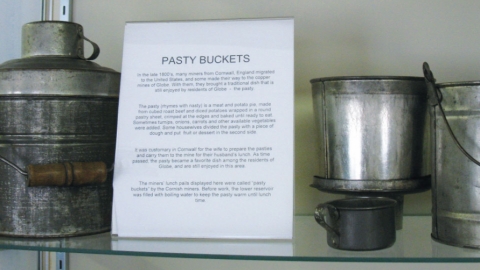Pasties Past and Present
During the late 19th century, about a quarter million people migrated to the United States from the county of Cornwall, England, most being miners. As these Cornish miners migrated farther and farther West from their English homes to Arizona mining towns such as Globe or Benson, they contributed not only their mining skills to their communities, but also their culture. The pasty, a savory reminder of this Cornish heritage, can still be found in many of Arizona’s former mining towns.
A Cornish pasty (rhymes with nasty rather than tasty, although it should be the other way around) can be likened to a glorified Hot Pocket or empanada. The flaky crust (attributable to lard or shortening) is stuffed with a combination of ingredients, the most traditional being beef, potatoes and onions. Variations on the classic ingredients range from the Welsh inclusion of turnips and carrots to a Mexican spin with chilies and cilantro. This ingredient flexibility was practical, allowing miners’ wives to make use of anything they had on hand.
According to Donna Anderson, longtime Globe resident, pasty aficionado and author of History of Globe, Arizona, the miners’ wives used to fill one end of the pasty with savory ingredients, the other with sweet ingredients such as fruit and place a dividing piece of dough in between so that the miners could have a complete meal.
But the pasty was supposedly popular for other reasons. Miners had to trek several miles to work and their hands were often covered in dirt and/or dangerous chemicals throughout the day. Luckily, the pasty’s construction makes it both portable and safe: Lunch pails with a sectioned-off portion for hot water, called “pasty buckets” (currently on display at the Gila County Historical Museum), were used to keep the pasties warm until lunchtime. By holding on to the edge of the crust, the miners could avoid consuming anything that was on their hands.
I know what your next question is and yes, there are a few places in Arizona to get your hands on a flaky-crusted pasty even today. Joe’s Broad Street Grill in Globe sells classic pasties every Thursday from 10:30 a.m. to 12:30 p.m. or until they run out (which they always do!). The Methodist and Pentecostal churches in many former mining towns continue to have annual pasty sales for fundraising.
In the Valley, you can satisfy your pasty curiosity at the Cornish Pasty Company in Tempe or Mesa. The Cornish Pasty Company offers a wide variety of traditional to not-so-traditional pasties from peppered steak and Stilton to salmon, leek and cream.
Joe’s Broad Street Grill, 247 S. Broad St., Globe; 928-425-4707. Cornish Pasty Company, 960 W. University Dr. #103, Tempe or 1941W. Guadalupe Rd., Mesa; cornishpastyco.com.
Kristen Rasmussen is a graduate student of nutrition, food activist and urban forager currently working as the nutritionist for ASU Dining Services. Originally from the Northern California coastline, she now enjoys exploring Arizona’s local food scene and making marmalade. Kristen is not sure where she will be experimenting with locally harvested goods in the fall, but is looking forward to the challenge (kristenrasmussen.com)







